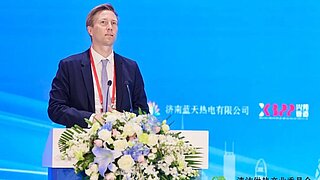The 2nd Sino-German Clean Heating Forum held in Beijing

On 10 May 2023, GIZ and the China Clean Heating Industry Committee (CHIC) under the framework of the Sino-German Energy Partnership co-organised the 2nd Sino-German Clean Heating Forum. The forum aims to promote the decarbonization of China’s heating sector and this time highlighted German heat metering experience. In cooperation with German Industry and Commerce Greater China (AHK Greater China), the event also serves as a platform for Chinese and German companies to discuss sustainable heating solutions, as well as the challenges and potentials of clean heating and its role in achieving the carbon neutrality goal in the heating sector.
The event is a subforum of the 4th China Clean Heat Industry Summit which is the biggest event in China for promoting sustainable heating solutions and successfully connects government, industry associations, academia and businesses. Invited by the Organizer, China Clean Heating Industry Committee (CHIC), Mr. Martin Hofmann, head of Cluster Climate, Energy, Environment and Biodiversity delivered a keynote speech sharing Germany’s goal on carbon neutrality in the heating sectors and the policy framework.
Ms. Magdalena Poirier, Advisor for Development Cooperation at the Economic Section of the German Embassy in Beijing, opened the Sino-German Clean Heating Forum together with the Secretary of CHIC. During her speech, she emphasized Germany’s goal to achieve a 50% share of renewable energies in the heating sector by 2030. In April, the German federal government further proposed an amendment to the Building Energy Act, requiring newly installed heating systems to be powered by a minimum of 65% renewable energy from 2024 onwards. Ms. Poirier also stressed that despite the current shortage of natural gas supplies, Germany's climate goals and coal phase-out targets remain unchanged.
China is currently reforming its heat metering system. Ms. Yin Yuxia, Project Director of the Sino-German Energy Partnership, therefore shared insights into the energy transition of the German heating sector and introduced the German consumption-based heat metering model. Key measures for decarbonizing the heating sector in Germany include the expansion of heat pumps and the low-carbon development of centralized heating. In Germany, heat metering is largely consumption-based, thereby providing consumers with an incentive to save energy. Additionally, the ongoing dissemination of smart heat meters will contribute to the coupling of heating and power sectors and improve the flexibility of Germany`s energy system.
After different German and Chinese companies had introduced their sustainable heating solutions, experts and business representatives shared their insights on challenges and opportunities of China’s heating transition during a roundtable discussion. Driven by the national climate goal, recent building energy efficiency policies, and the introduction of new standards have improved the environment for a heat metering reform. However, challenges remain, including an inadequate heat pricing system and conflicting interests among different stakeholders, e.g., heating companies vis-a-vis residents. During the panel discussion, the experts proposed several solutions such as improving the heat pricing system through policy measures, revising the current area-based pricing system, clarifying the responsibilities for energy efficiency in buildings, and promoting energy efficiency and carbon reduction in the heating industry.
As for the next step, the Sino-German Energy Partnership will continue the dialogue, provide policy advice, and promote the exchange between companies to accelerate both China’s and Germany’s low-carbon transition in the heating sector. For more information about the event and our work on heating transition, please contact Ms. Liliane Ronge (Liliane.ronge(at)giz.de) or Ms. Yuan Zhen (zhen.yuan(at)giz.de).
Available presentations of the event: